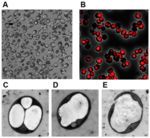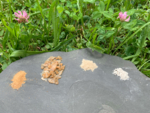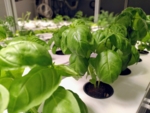-
-
-
-
Lentil cultivation in a producers’ association - EIP-AGRI Rhizo-Linse project - 23/05/2022
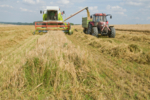
Complicated cultivation, fluctuating yields and complex cleaning: Leisa – as lentils are called in Swabian – are demanding. So to produce lentils economically, 130 farmers in the Swabian Alb have joined forces and set up the organic producers’ association Alb-Leisa. Their lentil harvests are processed and marketed by a company called Lauteracher Alb-Feld-Früchte.
https://www.biooekonomie-bw.de/en/articles/news/cultivation-market-lentils-swabian-alb
-
-
Lentil cleaning - EIP-AGRI Rhizo-Linse project - 26/04/2022

The Altdorf mill, just under 7 km south of the city of Böblingen, has operated lentil cleaning facilities since 2019, the year that the Sessler mill in Renningen, 20 km further north, ceased all operations including lentil cleaning. After receiving a number of enquiries from farmers and local mills, brothers Karl and Jörg Ruthardt took a chance and launched a lentil cleaning operation in addition to their mill and farm shop business.
https://www.biooekonomie-bw.de/en/articles/news/lentil-cleaning-altdorf-mill
-
-
Press release - 06/04/2022
The University of Stuttgart is contributing to innovations for climate protection as part of the EU project "Smart Circular Bridge". An old material is being rediscovered: flax has been with us for thousands of years in the form of clothing, sacks, and robust ship's ropes. Now the plant fibres are experiencing a renaissance and could become the building material of the future.
https://www.biooekonomie-bw.de/en/articles/pm/high-tech-bruecke-mit-flachs-gebaut
-
Filament winding technology for sustainable construction - 06/04/2022

One of the greatest challenges in the construction industry is the transition to more environmentally friendly and resource-saving buildings. Researchers at the University of Stuttgart are combining state-of-the-art robotic filament winding technologies with ancient local crops to produce stable and sustainable lightweight structures from flax fibres.
https://www.biooekonomie-bw.de/en/articles/news/robotic-building-natural-fibres
-
-
-
Lentil cultivation and cleaning on the farm - EIP-AGRI Rhizo-Linse project - 16/03/2022
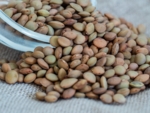
Lentils are among the oldest crop plants in Central European agriculture and were once a popular food in ancient Egypt, Persia and Mesopotamia. The legume was widespread in Germany until the mid-20th century, but has since disappeared completely from farmers’ fields. Over the past decade, lentils have reappeared as a crop grown locally and are cultivated in harmony with nature.
https://www.biooekonomie-bw.de/en/articles/news/lentils-return-heckengaeu-region
-
Alternative foodstuff ? - 09/03/2022
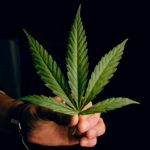
If there were a competition for the ‘crop of the future’, hemp would certainly be at the top. But not because of the intoxicating effect of some hemp varieties. Cannabis has the potential to help supply protein in the quantities required by a growing world population – in a sustainable way. The TASTINO project brings together researchers from academia and industry to work on ways to make the regional superfood available as a vegan alternative.
https://www.biooekonomie-bw.de/en/articles/news/hemp-regional-superfood-and-valuable-source-protein
-
Press release - 02/03/2022
The Ministry of the Environment, Climate Protection and the Energy Sector is funding the KoalAplan project, which extends the functional scope of a wastewater treatment plant. The project, based in the Stuttgart district of Büsnau, aims at recovering raw materials from wastewater and is therefore making a positive contribution to climate neutrality, as the products obtained replace fossil raw materials and energy-intensive processes.
https://www.biooekonomie-bw.de/en/articles/pm/biorefinery-project-koalaplan-extracting-raw-materials-wastewater
-
Press release - 02/03/2022
The Ministry for the Environment, Climate Protection and the Energy Sector is funding the new research project RoKKa which is used to prove the viability of recovering raw materials from wastewater. This adds a crucial function to the scope of a conventional sewage treatment plant. Together with the operators of the sewage treatment plants in Erbach and Neu-Ulm, the project partners demonstrate the positive contribution towards climate protection…
https://www.biooekonomie-bw.de/en/articles/pm/die-klaeranlage-der-zukunft-heisst-bioraffinerie
-
-
-
Protection against game damage - 13/01/2022
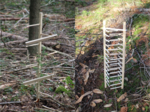
Young forest plants need protecting against damage and as a result it’s often hard to miss the colourful plastic tree guard sleeves when out walking in forests. These tree guard sleeves are neither pleasing to the eye nor sustainable. Bernd Schairer UG from Albstadt has developed sapling protectors made of wood that contain no plastics, metals or chemicals, do not require removal and disposal, and are produced in a socially responsible way.
https://www.biooekonomie-bw.de/en/articles/news/sapling-protectors-made-domestic-wood-simple-effective
-
Further utilisation of plant residues - 25/11/2021
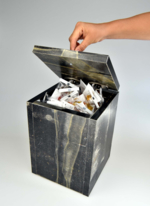
Biogas plants produce energy-rich gas by fermenting biomass. This process generates both liquid and solid fibrous and particulate fermentation residues. Researchers at the German Institutes of Textile and Fibre Research (DITF) have now managed to create a resistant and water-repellent fibre composite material from solid hop residues that can be used as a veneer to coat wood panels.
https://www.biooekonomie-bw.de/en/articles/news/novel-fibre-composite-made-hop-fermentation-residues
-
-
Compostable nappies - 14/10/2021

In an EU-funded project, the Tübingen-based biotech company Novis is working with international partners to develop a fully compostable nappy that contains no plastic parts. This could reduce the huge quantities of used disposable nappies that have been produced to date and the enormous costs of disposal, as well as avoiding the greenhouse gases produced when they are incinerated.
https://www.biooekonomie-bw.de/en/articles/news/nappies-sustainable-bioeconomy
-
-
Plastics from the field - 12/08/2021
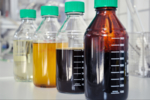
Huge amounts of waste are produced both during food production and by consumers. The Conversion Technologies of Biobased Resources group at the University of Hohenheim’s Institute of Agricultural Engineering has developed a process to convert this biomass into hydroxymethylfurfural (HMF), the highly potent basic chemical that is used to produce plastics.
https://www.biooekonomie-bw.de/en/articles/news/great-potential-biological-residues
-
-
Press release - 27/07/2021
The Hallertau is Germany's largest hop-growing region. During harvesting, hop bine chaff is left over, which is converted into environmentally friendly bio natural gas on site in a biogas plant. But that is not the end of the utilization chain for this fiber plant. Researchers at the German Institutes of Textile and Fiber Research Denkendorf (DITF) have used the plant-containing biogas digestate to produce a composite material that can be…
https://www.biooekonomie-bw.de/en/articles/pm/furniture-biogas-plant
Website address: https://www.biooekonomie-bw.de/en/search



